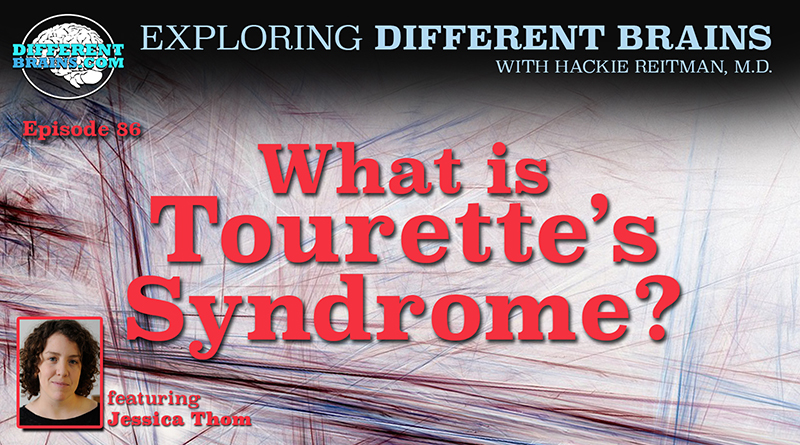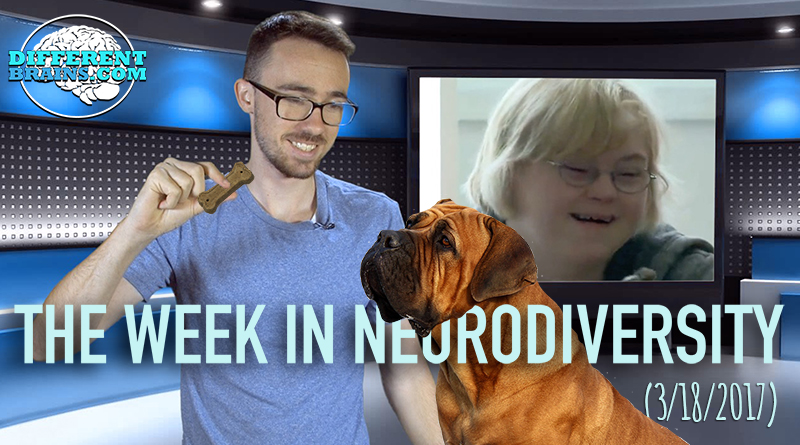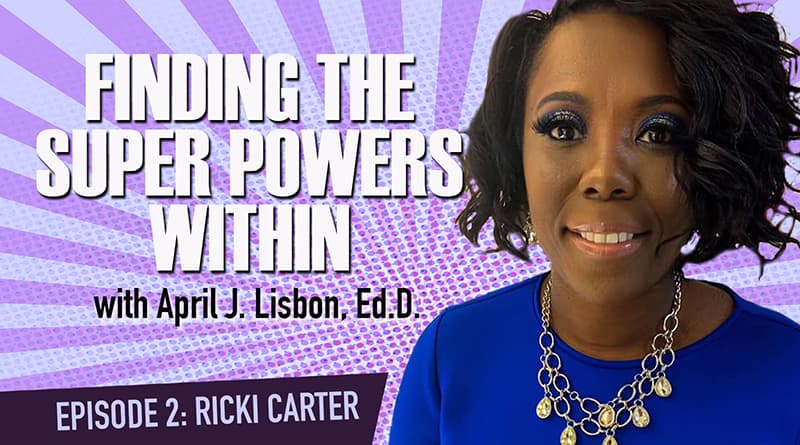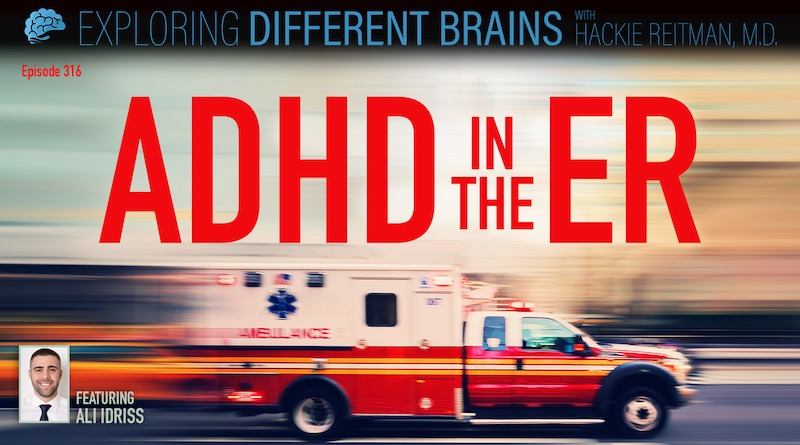
What is Tourette’s Syndrome? with Jess Thom of Touretteshero | EDB 86
(20 mins) In this episode, Hackie Reitman, MD. speaks with British advocate Jess Thom. Jess was diagnosed with Tourette’s syndrome at the age of 20, and is the co-founder of Touretteshero, as well as an artist, playworker, fundraiser. She defines what Tourette’s is, highlights some of the personal challenges it presents her, discusses its relationship to neurodiversity in general, and explains the important role receiving a diagnosis played in her life. Look for part two of her interview coming soon!
For more about Jess Thom and Touretteshero, visit: Touretteshero.com
.
44 Second Preview:
.
To listen or download the podcast version of this episode, see the embedded player below.
Or look for us on your favorite podcast provider:
iTunes | Stitcher | SoundCloud
[expand title=”View Full Transcript”]
Editor’s Note: Our guest this week, Jessica Thom, has Tourette’s syndrome. One symptom of this condition are vocal tics, which involves saying words repeatedly that do not apply to the conversation. We have included the tics in our transcription below to ensure we do justice to accurately portraying this example of neurodiversity.
HACKIE REITMAN, M.D. (HR): Hi, I’m Dr. Hackie Reitman and welcome to another episode of Exploring Different Brains and I’m very excited today because today, we go across the pond. We go all the way over to the U.K. and we are going to speak to someone named Jessica Thom. And Jessica Thom’s herself, did not get diagnosed until she was in her 20s with Tourette’s syndrome, which we’re gonna learn about today. Jessica thanks for being with us.
JESSICA THOM (JT): Thank you very much for having me. Biscuit
HR: Alright, now why don’t you explain to our Different Brains audience because some of them might not even know what Tourette’s is. And I’d like you to explain that.
JT: Biscuit. Biscuit. So Tourette’s Syndrome is a neurological condition that is characterized by involuntary movements and noises called tics. Biscuit. So—biscuit– those can include vocal tics like for me. Biscuit. Biscuit. And just so nothing gets lost in translation when I say biscuit, I would like you to think cookie. Biscuit. Biscuit means cookie in the UK. And also I have lots of involuntary motor tics, so involuntary movements. And for me the include banging my chest hundred of times a day. So I wear padded gloves to stop my knuckles from getting cracked and bloody and to protect my chest. Biscuit.
HR: Now, in addition to the tics you’re describing, do you have other challenges?
JT: Biscuit. Biscuit. So Tourette’s impacts on my life in a number of different ways. So, includes the tics that you can see, but my motor tics affect my mobility. So I got tics in my legs that mean my walking is very chaotic and wobbly. So I use a wheel chair to get around. Which is much more safer and makes me much more independent. Biscuit. Umm biscuit. And I am one of the ten percent of people with Tourette’s who has coprolalia, which is the technical name for obscene tics. So I have some rude and sweary tics as part of my condition. Biscuit, biscuit. Most people with Tourette’s, about 80%, will have other associated conditions. So like obsessive compulsive disorder, attention deficit and hyperactivity disorder–biscuit. I have some obsessive behavior–biscuit–but I don’t have lots of those other co-associated conditions. I am, however, dyslexic and dyspraxic–biscuit. Which was my first diagnosis, the first things that emerged that demonstrated that I was neurodiverse, the first things that identified for me.
HR: Well one of the reasons we founded differentbrains.com, is because I think it’s kind of a myth that any of these things exist in isolation. And they all have commonalities, common tools that can be used that are good for all of them. So we’re trying to get all of these challenges and differences under one roof. Whether it’s neurological, intellectual, developmental, mental health. And you have a bunch of the gamete yourself. So you’re a walking encyclopedia.
JT: Biscuit, hedgehog, biscuit. I embrace neurodiversity, so one of the reasons I created Touretteshero was because it helped me recognize the amazing spontaneous creativity that having a brain that works differently gives me access to. And I’ve come to see that and understand that as my power. And not my problem–biscuit. Hedgehog, catch, biscuit.
HR: Could you repeat that again?
JT: So I’ve come to understand that my tics are my power and not my problem–biscuit. Because they give me access, to an amazing, spontaneous, creativity, that I wouldn’t have otherwise–biscuit. And my vocal tics often collide together, like really unusual concepts and words to create new ideas–biscuit, hedgehog, writing, biscuit, I love cats.
HR: What is the biggest misconception that civilians, people who are not in the neurodivesity community or the Tourette’s community–what is the biggest misconception they might have about Tourette’s?
JT: Well the biggest misconception about Tourette’s–biscuit–is that it’s all about swearing. It’s often characterized as the swearing disease. People often don’t get the support that they need, because people find that side of it comic, or open to ridicule. In fact, only a very small percentage of people with Tourette’s have rude tics. 90% don’t have any swearing tics, or obscene tics at all. I think other big myths are the fact that just saying what’s on your mind–biscuit–and I could promise you, I definitely don’t think about biscuits–hedgehogs–or hedgehogs or cats nearly as much as I talk about them. Biscuit. And it’s also not rare. it’s not a rare condition. Biscuit. Some people are effected in really mild ways, and their tics will be very noticeable, while others will have more intense tics, which will be more obvious to other people. Biscuit.
HR: What do you think the occurrence is?
JT: Biscuit. I think it’s about one in one hundred, is what I’ve understood it to be, the occurrence.
HR: Now based on your knowledge, what’s the big difference about the way Tourette’s might be understood and treated in England, versus how it might be over here in the United States?
JT: We had a really exciting opportunity with Backstage in Biscuit Land to travel a lot to different countries and to tour all over the UK, and to tour and travel in the US. And what’s interesting is that I think most of the understandings and attitudes to Tourette’s are similar. There are some people who have a lot of understanding and are really open to being supportive. And there’s some people who find it a more challenging condition and don’t understand straight away and need some help to imagine what it’s like to live with Tourette’s. I think one of the things that I noticed more broadly is that in the US, you have really great legislation in the American with Disabilities Act around access to your public spaces. And so I think that your legislation around disabled people and around access feels really strong–biscuit. And we have legislation in the UK, but perhaps sometimes that’s not what’s as enforced enthusiastically as it seems to be in the US. And so maybe spaces aren’t as accessible as they are in the states. Biscuit. One of the things that I do feel very proud to be part of in the UK is an amazing disability arts scene. Where there are lots of disabled people who are working as artists, and making work about their experiences. and from what I’ve scene internationally, it can be harder for people who have different experiences to connect with each other, either because of space or like distance or resources. And I suppose that’s the one thing that has been really important to me is meeting other people with Tourette’s, seeing other disabled artists, and seeing my people having careers and succeeding in all types of worlds. Biscuit. And I think that’s really important for young people who are neurodiverse and are living with a condition that makes them potentially stand out. It’s to see people who look, move, and sound like they do, succeeding in all types of worlds.
HR: What has been your biggest challenge at this point in time?
JT: Well–biscuit–I think some of the biggest challenges I have personally in terms of living with Tourette’s is the fact that it’s a fluctuating condition so it goes up and down in the course of someone’s life. Which could mean that tics look quite different one day to how they might another day. And it could mean that just as you get used to a tic, and new set of tics could occur. And that can be shocking. And it can be hard to adjust. And it could be frightening to experience your mind or your body changing in ways that you hadn’t expected and having to adjust to that. Biscuit. But there is yet to be a set of tics or tics that I haven’t been able to overcome with the right support and with some creative thinking. Biscuit, hedgehog.
HR: Now I see that the tics give you plenty of exercise. What else do you do for exercise?
JT: Biscuit. I go swimming. So I swim almost every day. I love swimming and being in the water, and I’m very lucky to have a hydrotherapy pool near me as well so as well as swimming for exercise. I could always swim for relaxation and to stretch my muscles. I also go to an amazing accessible cycling project called wheels for wellbeing that we have here in London that provides all sort of adaptive bicycles for disabled people to use. And that means that I can get my heart going and keep fit in a way that I might otherwise find challenging.
HR: You know, I can say as a sports medicine and orthopedic surgeon that one of the most underrated exercises and underused is getting in a pool and doing any kind of exercise because it works in so many good ways. It’s non-weight bearing for the most part. Yet it’s resistive, and it’s cooling and it soothes and it’s great. Now, we have plenty of studies to show how exercise successfully helps rewire your brain, along with a good diet. What kind of diet do you eat?
JT: Biscuit. Well I’m mainly vegetarian. I eat very little dairy products as well, so I wouldn’t say that I’m a full vegan. But I try and follow a vegan diet. And I try to eat healthily and eat a variety of foods–biscuit. Make sensible choices and eat things that I enjoy but eat it in moderation. Biscuit. Hedgehog.
HR: Well, study after study has shown that a diet like yours that’s mainly plant-based or Mediterranean style diet, and if you avoid all the processed stuff, that it really is helpful not only for your heart and your whole body, but they have numerous studies now showing the rewiring in your brain for a positive nature. Would you care to comment for our audience out there who might have all different kinds of neurodiversity challenges, about interpersonal relationships?
JT: Biscuit. Biscuit. So I have a really strong support network that’s been really important to me as my tics have intensified. I also have a team of support workers, although I have my tics effect my mobility and my tics are sort of very constant, I also have seven intensive vocational tics several times a day which could mean during which I could totally lose control of my body and speech. Which means that I need constant support and supervision to make sure that I’m safe and to mean that my tics intensify that I have someone on hand to make sure that I’m not at risk. And that obviously could backfire. Having that sort of level of intense support could put pressure on relationships. And it could be–and I certainly found at the beginning really hard to accept that level of help. But a really important idea for me was the idea that another disabled comic, a friend of mine called Laurence Clark, who’s an amazing disabled comedian and writer. I read something that he wrote about the idea that being independent doesn’t mean having to do everything by yourself. Being independent is being in control of your own decisions, and knowing when to ask for help and accepting help when you need it. So I consider my self fully independent and I can lead an independent life and I can be in control of my decisions. But I also need the support of other people. And I have lots of amazing supportive networks, that’ve been crucial to me. And that includes other people with Tourette’s, that includes the disabled community and it includes my support workers and personal assistants. Biscuit.
HR: Jessica, you were not diagnosed until your 20s. What were you being told up until that time?
JT: Well-biscuit, biscuit–as a child, my tics were much milder. The first tics that I could remember were when I was about six. Biscuit. And then I was voluntarily squeaking, making facial expressions. My tics intensified in my early 20s. I began to have a much bigger impact on my life. And I initially resisted diagnosis because I didn’t see what it would add to my life. I–biscuit–probably known I had Tourette’s from my late teens–biscuit–but I thought “well, what’s the point in getting a diagnosis now? What will that add?” But I was wrong. Biscuit. Being able to understand something that had always been a big part of me, and have a way of explaining it to other people was absolutely crucial. And it also meant that I was able to get the right support. Biscuit. And talking to the right services and the right techniques and the right strategies helped me manage my life and my tics, and a condition that changes. Biscuit. When I was a child I did also have a diagnosis of dyslexia and dyspraxia, and I think my behavior was very unusual and very impulsive and I was very active. And I think I was lucky in that even though I didn’t have a former diagnosis of Tourette’s, my unusual behavior was understood in the context of neurodiversity. And I was actually supported well at school, despite the fact that Tourette’s wasn’t as understood and it wasn’t something that had been identified as an issue for me. Biscuit.
HR: Well, Jessica Thom, it is a pleasure to be speaking with you here. What other challenges might you have that are not readily apparent?
JT: So I suppose one of the issues for me that most people wouldn’t necessarily see at the moment, is that I have been experiencing chronic pain the last year. The exact cause of that hasn’t been identified, but it’s probably due to lots of the barrings of strong physical movements, involuntary movements that I make and the impact of that on my body. And so I think that for me adjusting to living with pain is has been a challenge. And that–biscuit–has obviously been a challenge. And that obviously has been an impact on my stamina and my energy and my sleep. Biscuit. And sleep, with Tourette’s, can be tricky. And getting to sleep and staying asleep can be hard. I use a weighted blanket to help me sleep. As well as trying to observe really healthy sleeping routines and practices. Biscuit. And sometimes, people see the big tics, they see the big movements and noises that I make. But there are often lots of smaller, less noticeable movements, and sometimes those are the ones that I notice or that can prevent me from getting to sleep or can cause me pain. Biscuit.
HR: What is one piece of advice you would give to someone who has just been diagnosed with Tourette’s, or other neurodiverse diagnosis?
JT: I would say learn about the condition–biscuit, biscuit–don’t be afraid to find out more and to ask questions. Biscuit. Reach out to the community of people living with that condition. For me, connecting with other people with Tourette’s was really key in helping me to accept myself. I put it off for ages and I don’t know why. Biscuit. And then when I met other people with tics, I realized I’d never expect them to hold their tics in, or be embarrassed by them. So why did I expect that out of myself? So don’t be embarrassed by who you are. Don’t be afraid to be open with other people and–biscuit–accept yourself exactly as you are and to develop ways that sharing that and your talents with other people. Biscuit.
HR: Jessica Thom, how can our Different Brains audience learn more about you?
JT: Biscuit. They can visittouretteshero.com, our website–biscuit–and explore it, or follow us on social media on Facebook and twitter. And for any young different brains viewers, the website has a safe mode and with one click you can remove and make invisible any rude words. Biscuits, hedgehogs, cats. Biscuit.
HR: Can you explain that a bit?
JT: Biscuit, yes, biscuit. I am one of the 10% of people with Tourette’s that has some rude tics. And not including them as part of the site–biscuit–felt wrong, it felt like editing out part of my disability. And I wanted to make sure that they were included. Biscuit. Because of those tics are really funny and really interesting and it’s part of my experience. But we also wanted to make sure that the site was accessible to children and to young people and to a really road audience. And so we created a safe mode, which means there’s essentially two sites. There’s a site sort of with more adult or rude content, and with one click of a button, you can choose to make all of that invisible. So you can explore it with a child, share it with a child, and they can enjoy learning about Touretteshero without having to worry about seeing anything that might upset them or confuse them or lead to any uncomfortable conversations. Biscuits, cats.
HR: Jessica, thank you so much for being with us. It’s been a pleasure, I’ve learned so much talking to you. Keep up the great work you’re doing onstage, and offstage, and talking at TED Lectures, and doing all the stuff you do, teaching us about Tourette’s and other neurodiversity challenges. You’re an inspiration. Thank you so much!
JT: Thank you very much! Thank you for having me, what a lovely conversation. Yees, cats!
[/expand]
This video is owned by Different Brains Inc, kindly donated by it’s original producer PCE Media LLC.
Different Brains® Inc. founder Harold “Hackie” Reitman, M.D. is an author, filmmaker, retired orthopedic surgeon, former professional heavyweight boxer, the past chairman and president (and current board member) of The Boys and Girls Clubs of Broward County, and a neurodiversity advocate. However, it was his role as a father that led to the creation of the DifferentBrains.org website.
Hackie’s daughter Rebecca grew up with epilepsy, 23 vascular brains tumors, and underwent 2 brain surgeries before the age of 5. Her struggles and recovery put him on the road to, through 26 professional heavyweight boxing matches, raising money for children’s charities (to which he donated every fight purse).
Rebecca eventually went on to graduate from Georgia Tech with a degree in Discrete Mathematics, and Dr. Reitman wrote and produced a film based on her experiences there (The Square Root of 2, starring Darby Stanchfield of ABC’s Scandal). After graduation, Rebecca received a diagnosis of Asperger’s syndrome. Hackie, shocked at his own ignorance of the topic despite being an M.D., embarked on years of research that culminated with his book Aspertools: The Practical Guide for Understanding and Embracing Asperger’s, Autism Spectrum Disorders, and Neurodiversity (released by HCI books, publishers of the Chicken Soup for the Soul series).
This experience revealed to Hackie the interconnectedness of the conditions that fall under the neurodiversity umbrella, while alerting him to the in-fighting and fractured relations that often plague the organizations tasked with serving the community. Convinced that overcoming these schisms could help all of society, Hackie forged the Different Brains philosophy of inclusive advocacy: “Supporting Neurodiversity – From Autism to Alzheimer’s and All Brains In Between”.
In the company’s initial years of operation, Hackie self-financed all of the content on DifferentBrains.org, all of which offered free to view to the public. Currently he is the host of our weekly interview show Exploring Different Brains, writes blogs for the site, and tours the country speaking at conferences, conventions and private functions, all with the goal of improving the lives of neurodiverse individuals and their families, and maximizing the potential of those with different brains. Separate from Different Brains, Hackie is the founder and CEO of PCE Media, a media production company focusing on reality based content. He recently co-executive produced the documentary “Foreman”, the definitive feature documentary on legendary boxer and pitchman George Foreman.




